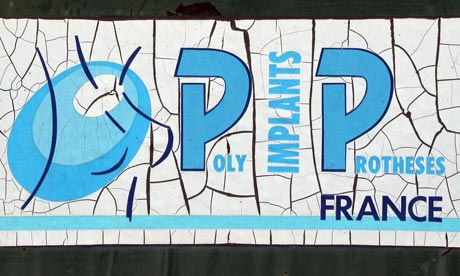
They call themselves the "pipettes", a group of 30 French women, who like hundreds of thousands of others caught up in global heath scare, are walking around with a potential timebomb in the shape of defective breast implants.
Until recently in France, the prevalent view, if anyone bothered to have one, was that by undergoing surgery for cosmetic reasons they were paying the price of their own vanity. But in November 2011, pipette Edwige Ligonèche, 53, died of a rare lymph cancer, three years after an implant made by the French company Poly Implant Prothèse (PIP) ruptured in her left breast, and France woke up to a health scandal.
"I swore to Edwige that if things ended badly for her, I'd make sure it didn't result in general indifference," said Alexandra Blachère, president of a group of PIP implant patients. She kept her promise. After a public outcry, the French government has launched investigations into the scandal, police inquiries are under way and the European Union is reviewing its regulations.
There is a tragic sense of deja vu to this. A year ago, health minister Xavier Bertrand issued a mea culpa over the failure of the French health authorities in another devastating scandal.
The diabetic drug Mediator, wrongly used by doctors as a slimming aid, had been prescribed for more than a decade despite fears over its safety and despite being linked to 2,000 deaths. Officials, it appeared, had ignored warnings of its dangers.
Bertrand promised reform, but doctors and patients now fear the two scandals are just the tip of an iceberg of malpractice and potentially deadly deception in the health and pharmaceutical industry.
The implant scandal has again thrown the spotlight on France's health watchdog, AFSSAPS (the Agence Française de Sécurité Sanitaire des Produits de Santé), which has a €115.5m (£95.5m) budget, employs nearly 1,000 full-time staff, almost 2,000 part time experts and has three laboratories.
The agency, formed in 1998 after a scandal over blood contaminated with HIV, was to "evaluate the benefits and the risks linked to the use of health products" making sure they were "as safe as possible". Although given no role in approving medical devices such as breast implants, it is supposed to be aware if such devices cause health concerns.
However, AFSSAPS claims it was unaware of repeated health alerts over PIP implants since 2000, when the US Food and Drug Administration inspected the company's factory.
Although the FDA sent and later published a warning letter to PIP saying its implants did not meet health standards and noted there had been 120 complaints about them, AFSSAPS insists it never knew about the letter.
There were other warnings. Christian Marinetti, president of a plastic surgery clinic in Marseille, repeatedly told AFSSAPS from February 2008 onwards about PIP implants rupturing. Finally, after reporting 14 incidents with no reply he sent a recorded delivery letter to the agency denouncing a "health scandal".
When that went unanswered, he sent another. This prompted agency inspectors to pay a surprise visit to the PIP factory in south-eastern France in February 2010, where they found unauthorised gel was being used.
Jean-Claude Ghislain, director of evaluation of medical devices at AFSSAPS, has said: "There was a falsification of documentation, which obviously made audits very difficult."
But PIP has said it was able to hide incriminating documentation and substandard material because it was given notice of audit visits.
Laurent Gaudon, lawyer for some of the PIP victims, said the agency should have heeded the warnings long before 2010. "The US specifically banned PIP silicone breast implants in 2006, surgeons in Marseille raised the alarm in 2008," he said. "Why did it take AFSSAPS so long to realise there might be something wrong?"
"Is the PIP implant scandal the tip of the iceberg?" asked L'Express magazine this week. Pierre Faure, president of the medical devices committee for the Paris hospital authorities, thinks it might be. "Around 20% of implantable medical devices around today have not benefited from clinical trials proving their harmlessness after three, four or five years," he said. As part of promised reforms, AFSSAPS is due be replaced by a new body, ANSM, which will have a wider remit. But the French public need to be reassured that this is more than a rearrangement of letters.
Irène Frachon, a doctor who highlighted the Mediator scandal, said France needs to accept the legal principle of class action – which does not exist in French law – to provide a "counter-power" to the manufacturers whose chief concern is profit.
""We shouldn't be surprised that industrial companies will cross the line and put people's lives in danger to boost their own turnover," she said.
"We need stricter regulation and greater vigilance because medicines and medical devices and drugs are not cars. But the industrials rely on finance, so we have to hit them where it hurts; in the pocket. If the laboratories know if they do something wrong they could face a class action they may think twice. At the moment, it's a David and Goliath fight and the victims are being crushed."
Gaudon said his clients were suffering terrible anguish. "They are terrified, living under a threat, wondering if they're going to get cancer in 10, in 20 years," he said. "The company has acted without scruples and without any compassion for the victims."
There is certainly not much sympathy for the pipettes – or for the estimated 400,000 women worldwide with PIP implants – from the head of the company, Jean-Claude Mas, 72, currently under investigation for "aggravated deception". Asked by police if he had anything to say to those women living with a sword of Damocles over them, Mas replied: "Nothing."

